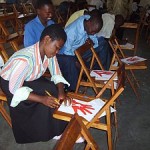Seventh Circuit Weighs in on Bankruptcy Fraud
 In the wake of a surge in bankruptcies, can a boom in bankruptcy fraud prosecutions be far behind? If so, district court judges will benefit from the Seventh Circuit’s opinion today in United States v. Peel (No. 07-3933), which addressed a number of unsettled legal questions.
In the wake of a surge in bankruptcies, can a boom in bankruptcy fraud prosecutions be far behind? If so, district court judges will benefit from the Seventh Circuit’s opinion today in United States v. Peel (No. 07-3933), which addressed a number of unsettled legal questions.
The facts in Peel were unusually lurid for a bankruptcy case. Back in the 1970’s, Peel had an affair with his wife’s sixteen-year-old sister. Although the affair ended after a few months, Peel kept several nude pictures of the sister. Some time later, Peel was divorced from his wife, and bankruptcy followed. Peel’s largest financial obligation was to his ex-wife: $230,000 plus an additional $2500 per month for the rest of his life, pursuant to the terms of the divorce settlement. The ex-wife filed a claim in the bankruptcy proceedings in order to ensure that these obligations were not discharged. Peel then attempted to pressure her into dropping the claim by threatening to release the nude pictures of her sister. The ex-wife complained to police, and Peel was eventually convicted of bankruptcy fraud, obstruction of justice, and possession of child pornography.
Judge Posner, writing for the court, addressed several issues relating to Peel’s convictions and sentence.


